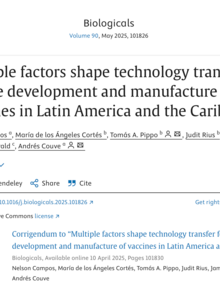AbstractThe COVID-19 pandemic highlighted significant inequalities in access to medicines and emergency supplies, including vaccines, that persist in Latin America and the Caribbean. From a regional perspective, it is necessary to improve the conditions to ensure more equitable and inclusive access to health technologies, both in normal scenarios and during future biological threats. Technology Transfer emerges as an effective tool to permanently avoid scarcity in global and regional vaccine supplies. Here we describe the global and regional ecosystem of Technology Transfer, its actors, roles, interactions, and evolution through research of publicly available documents and interviews with experts from the region and international institutions. Additionally, we identify and analyze vaccine projects, characterize typologies of projects in the region, suggest an evolution of three temporal phases, reveal lessons from the COVID-19 pandemic and identify four drivers that expedite vaccine Technology Transfer in Latin America and the Caribbean. These drivers include (i) strengthening of regulatory capacities for vaccines; (ii) adoption of trade standards; (iii) increasing manufacture capacity, R&D, and human resources; and (iv) consideration of aggregated demand. Finally, we present recommendations to maximize the potential of scientific-technological and vaccine production capacities in Latin American and the Caribbean. They relate to the four drivers, the promotion of complementary industries, data access and availability policies, inter-institutional dialogue and coordination, public health considerations, and future work in areas of information opacity. |

